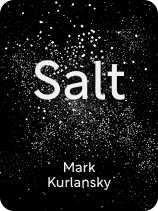

This article is an excerpt from the Shortform book guide to "Salt" by Mark Kurlansky. Shortform has the world's best summaries and analyses of books you should be reading.
Like this article? Sign up for a free trial here.
What is Salt by Mark Kurlansky about? What are the main takeaways of the book?
In Salt, Mark Kurlansky presents a history of salt and describes the role it played in nourishing our ancestors, driving innovation, and building empires. Further, you’ll learn why salting food isn’t just about improving its flavor, and salt’s important role in independent movements.
Read below for a brief overview of Salt by Mark Kurlansky.
Salt by Mark Kurlansky
Salt is one of the cheapest, most commonplace items: It sells for less than a loaf of bread, and during winter, we scatter it liberally on roads and sidewalks. However, there was once a time when salt was considered rare and valuable. In Salt, Mark Kurlansky argues that throughout much of human history, salt was a precious commodity—one that significantly shaped civilizations. He traces the history of salt, describing the role it played in nourishing our ancestors, driving innovation, building empires—and even provoking rebellions.
Kurlansky, an American journalist, has published over 30 books on topics ranging from the history of cod to the history of nonviolent activism. While Salt is also a history book, it isn’t just for history buffs: It spans a variety of topics ranging from cooking to engineering, making it relevant to anyone seeking to better understand why the world looks how it does today.
What Is Salt?
When most people think of salt, they likely picture a sprinkling of white crystals and imagine a salty taste. However, according to Kurlansky, salt is more than this. He explains that salt is a term chemists use to describe a compound that’s produced when an acid reacts with a base. Kurlansky elaborates on the diversity of salts with the following facts:
Fact 1: Only some salt is edible. Some of the most common edible salts include table salt (sodium chloride) and baking soda (sodium bicarbonate). Inedible ones include barium chloride, a highly toxic salt used to make red pigments.
Fact 2: Salt can taste salty, sour, or bitter. For instance, magnesium chloride is a bitter salt that’s often found in baby formula.
Fact 3: Not all salt is white. It can also be pink, red, gray, or other colors depending on how and where it’s harvested. For instance, some salt is pink because it contains traces of several minerals.
Salt’s Biological Significance
According to Kurlansky, salt has played an important role throughout history because it’s necessary for humans’ and animals’ survival. Salt is crucial to cell function, brain and nervous system function, and digestion. Each of these bodily processes uses up salt, so we need to consume it to replenish our salt levels.
Kurlansky adds that to stay healthy, we and animals have to consume the right amount of salt. When you don’t consume enough salt, you become nauseated and weak. If you’re deprived of salt for too long, you die. On the other hand, eating too much salt may also harm you. For instance, some experts claim that excessive salt consumption raises your blood pressure.
Salt’s Culinary Significance
In addition to enabling our survival, salt has culinary significance. Kurlansky argues that salt has played an important role in shaping cuisines around the world. First, salt preserves food, making it possible to eat when food production is low (such as during droughts). Second, salt is a seasoning that makes food more flavorful and palatable.
Salt’s Impact on Innovation
Because salt is necessary for life and eating, people throughout history have been motivated to develop ways to harvest it. Kurlansky argues that throughout history, salt has driven technological and scientific innovation.
Salt Industries’ Impact on the Environment
Kurlansky argues that throughout history, salt industries and salt-related innovations have degraded the environment. Environmental damage in the English county of Cheshire, England’s leading salt producer for several centuries, exemplifies several of the ways salt industries can degrade the environment:
- Destruction of forests. Wood fueled Cheshire’s brine-boiling process of harvesting salt, and by the 17th century, salt harvesters had cleared most of the county’s forests.
- Air pollution. In the late 1800s, coal-burning furnaces fueled brine-boiling—and filled Cheshire’s skies with black plumes of soot.
- Sinkholes. Starting in the 18th century, sinkholes began wrecking homes and bridges in Cheshire. When harvesters pumped excessive brine from underground reserves, groundwater filled the gaps and dissolved the salt rock, causing sinkholes.
Salt’s Economic and Political Significance
Salt industries throughout history may have damaged the environment, but leaders of salt industries believed this damage was worth it—because salt production was extremely lucrative. Kurlansky argues that for most of human history, salt had both economic and political significance due to the profitability of the salt industry.

———End of Preview———
Like what you just read? Read the rest of the world's best book summary and analysis of Mark Kurlansky's "Salt" at Shortform.
Here's what you'll find in our full Salt summary:
- The role salt played in driving innovation, building empires, and provoking rebellions
- Why salting food isn’t just about improving its flavor
- How salt played an important role in several independence movements






